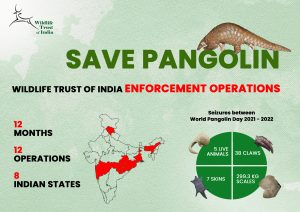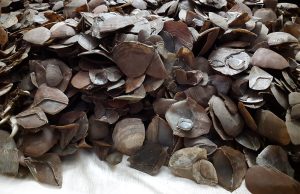World Pangolin Day special: Saving the most trafficked mammal in a digital world
Pangolin is considered the most trafficked mammal in the world. This elusive, mostly nocturnal animal is extensively traded for its body parts – mainly scales and skin. While the scales are used in Traditional Chinese Medicine which are claimed to treat ailments such as heart disease and supposedly have aphrodisiac properties, the skin is used for making leather products. Pangolin trade is also linked to the narcotics industry as the scales are believed to contain a substance used to make psychotropic drugs.
These unreasonable demands for pangolin body-parts have resulted in the killing of thousands of pangolins globally every year. Between 2009 and 2018, law enforcement agencies in India confiscated over 7,500 kilogram of pangolin scales that would have been collected after torturing and killing nearly 10,000 pangolins in the wild. Recently, the Nigeria custom officials seized a whopping 9,000 kilogram of pangolin scales in a single raid. These examples are just the tip of the iceberg.
To counter this incessant trafficking, pangolin species have been accorded protection under various national and international laws. But the trade continues to grow into a well-organized syndicate that operates not just offline, but also online through the use of social networking platforms.

Cyber ‘spotters’ versus Cyber ‘traders’
With over 560 million active internet users in India, the virtual marketplace is expanding. The use of social media and e-commerce websites for the exchange of information, goods and services is on the rise. On the flip side, internet prevalence has also led to the emergence of cybercrime. Wildlife traders too are using the cyberspace to market illegal wildlife articles on online platforms, such as YouTube and Facebook.
In response to this growing menace, Wildlife Trust of India has assigned a dedicated team of “Cyber Spotters” who are constantly monitoring and busting online trade networks dealing in wildlife articles.
YouTube videos uploaded by channels trading pangolins present a horrifying scenario where these animals are captured, tortured, skinned and auctioned. Acting on the links, WTI’s cyber spotters reported more than 35 such YouTube channels and helped remove them from the platform.
The information gathered through the “Cyber Spotter” monitoring programme is always developed into actionable intelligence which is shared with the central and state enforcement agencies. Last year, such tip-offs resulted in 12 enforcement operations in 12 months. As a result, nearly 300 kilogram of pangolin scales, 38 pangolin claws, 7 pangolin skins and 5 live pangolins were seized. Further, a similar tip-off to the enforcement agencies in Indonesia resulted in the seizure of 185 kilogram of pangolin scales and other wildlife articles in a single raid.

How can you help?
“CYBER HAWK” mobile application is a citizen-science initiative created by WTI to provide an easy platform to the citizens of India for reporting cyber wildlife crime. On this World Pangolin Day, Wildlife Trust of India invites everyone to join our cyber spotter network using Cyber HAWK and become the eyes and ears of enforcement agencies in capturing wildlife trade online. It is only through our collective efforts that we can save Pangolins.









